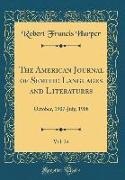Read more
Excerpt from The American Journal of Semitic Languages and Literatures, Vol. 24: October, 1907-July, 1908
A word in regard to the punctuation of the Hebrew text which here follows. Punctuation is as indispensable in Semitic as in English or any other language, and it is time that some usable system were adopted for our editions of Old Testament writings. Unpointed and unpunctuated Hebrew selections are occa sionally useful - just as unpointed Greek texts are often used for pedagogic purposes; but when the books of the Old Testament are intended not for classroom \drill, but for the multitude who read them for'the sake of their contents, to leave them without punctuatlon Is to leave them half edited. So long as the masso retio text is - left untouched, one can make a Shift of using the division of clauses and phrases made by the accents; Since these, though always inexact and often misleading, may be used as a poor substitute for a system of punctuation. But the accents are not always correctly placed; and, what is worse, it is not pos sible to rearrange them at pleasure. It occasionally happens, for example, that the massoretic verse-division is 1ncorrect. This does not, however, justify any modern scholar in moving the séf pdsiig (3) to another place. The sof pdsug belongs to a compli cated and very carefully wrought system, in which the disarrange ment of any one part affects the rest. A Hebrew text in which the verse-dividers are shifted, while the remaining massoretic accents are left as they were before, is a monstrosity. The same is true of the attempt to shift the other accents. It Often happens that the chief pause 'within the verse, marked in the traditional punctuation by the athnachtd (a), has been wrongly indicated, through misunderstanding of the text. But moving the athnachtd to another place is like altering music by moving an occasional bar one or two notes forward or back. The massoretic notation was made for all time, and ought not to be tampered with. To endeavor to make use of it in our modern emended texts of the Old Testament is to attempt the impossible - and the undesirable.
About the Publisher
Forgotten Books publishes hundreds of thousands of rare and classic books. Find more at www.forgottenbooks.com
This book is a reproduction of an important historical work. Forgotten Books uses state-of-the-art technology to digitally reconstruct the work, preserving the original format whilst repairing imperfections present in the aged copy. In rare cases, an imperfection in the original, such as a blemish or missing page, may be replicated in our edition. We do, however, repair the vast majority of imperfections successfully; any imperfections that remain are intentionally left to preserve the state of such historical works.

